List of Governors of Missouri
| Governor of Missouri | |
|---|---|
|
Seal of Missouri | |
| Style | The Honorable |
| Residence | Missouri Governor's Mansion |
| Term length | Four years, renewable once (maximumly lifetime) |
| Inaugural holder | Alexander McNair |
| Formation | Constitution of Missouri |
| Salary | $133,821 (2013)[1] |
| Website | https://governor.mo.gov |
Following is a list of Governors of Missouri since its territory became part of the United States.
| Party | Governors |
|---|---|
| Democratic | 38 |
| Republican | 13 |
| Democratic-Republican | 3 |
| Liberal Republican | 1 |
Missouri was part of the Louisiana Purchase, which the United States purchased from France in 1803. In its first year it was part of Louisiana. In 1804 all of the territory above what is modern-day Louisiana was broken off and administered by a governor based in St. Louis, Missouri until statehood.
Prior to the purchase both France and Spain administered the territory in a similar manner. France initially had a commandant in charge of Upper Louisiana. Spain around 1770 began having a lieutenant governor in St. Louis and governor in New Orleans, Louisiana ruling the whole territory. For a list of governors under Spanish and French rule see Louisiana Governor. For a list of lieutenant governors ruling Upper Louisiana under French and Spanish control see List of commandants of the Illinois Country.
Since the state capitol moved to Jefferson City in 1826 the governor has lived on the same block in the Missouri Governor's Mansion a block east of the Missouri State Capitol (although the current mansion is the third one).
The current governor of Missouri is Republican Eric Greitens.
Governors
Commandant of Louisiana
| # | Picture | Commandant | Took office | Left office | Appointed by |
|---|---|---|---|---|---|
| 1 |  |
Amos Stoddard | March 10, 1804 | October 1, 1804 | Thomas Jefferson |
Governor of the District of Louisiana
On March 26, 1804, an act of congress divided Louisiana into two territories or districts: land south of the 33rd parallel became the Territory of Orleans; land north of the 33rd parallel, the District of Louisiana. The act took effect October 1, 1804, upon which the District of Louisiana was placed under the governance of Indiana Territory, then governed by William Henry Harrison.[2]
| # | Picture | Governor | Took office | Left office | Appointed by |
|---|---|---|---|---|---|
| 1 |  |
William Henry Harrison | October 1, 1804 | July 4, 1805 | Thomas Jefferson |
Governors of Louisiana Territory and Missouri Territory
The citizens of the District of Louisiana, unhappy with the governance specified by the act of 1804, set about immediately to petition congress for a return to a military-style government to which they were accustomed under Spanish rule. Congress responded by passing an act on March 3, 1805 which changed the name of the District of Louisiana to the Territory of Louisiana. Power was vested in a governor who was appointed by the President to a term of 3 years. During times of vacancy, the secretary would act as governor.[2]
On June 4, 1812, the Territory of Louisiana was renamed to the Territory of Missouri to avoid confusion with the newly admitted state of Louisiana. Later, Arkansas Territory was separated from the Territory of Missouri on July 4, 1819.[2]
| # | Picture | Governor | Took office | Left office | Appointed by |
|---|---|---|---|---|---|
| 1 | 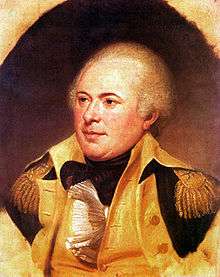 |
James Wilkinson | July 4, 1805 | March 3, 1807[B] | Thomas Jefferson |
| 2 |  |
Meriwether Lewis | March 3, 1807 | October 11, 1809[C][D] | Thomas Jefferson |
| 3 | 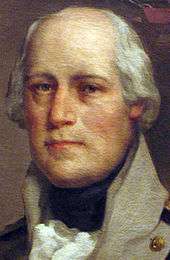 |
Benjamin Howard | April 17, 1810 | October 31, 1812[E] | James Madison |
| 4 |  |
William Clark | July 1, 1813 | September 18, 1820 | James Madison James Monroe |
Governors of Missouri
- Parties
Democratic-Republican (3) Democratic (38) Republican (13) Liberal Republican (1)
| # | Portrait | Took office | Left office | Party | Terms[G] | ||||
|---|---|---|---|---|---|---|---|---|---|
| 1 | 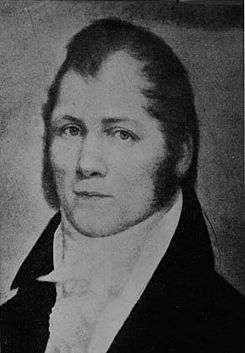 |
Alexander McNair | September 18, 1820 | November 15, 1824 | Democratic-Republican | William Henry Ashley | 1 | ||
| 2 |  |
Frederick Bates | November 15, 1824 | August 4, 1825 | Democratic-Republican | Benjamin Harrison Reeves | 1⁄3[C] | ||
| 3 |  |
Abraham J. Williams | August 4, 1825 | January 20, 1826 | Democratic-Republican | Vacant | 1⁄3[H] | ||
| 4 |  |
John Miller | January 20, 1826 | November 19, 1832 | Democratic | Daniel Dunklin | 1 1⁄3[I] | ||
| 5 |  |
Daniel Dunklin | November 19, 1832 | September 30, 1836 | Democratic | Lilburn W. Boggs | 1⁄2[J] | ||
| 6 |  |
Lilburn Boggs | September 30, 1836 | November 16, 1840 | Democratic | Franklin Cannon | 1 1⁄2[K] | ||
| 7 | Thomas Reynolds | November 16, 1840 | February 9, 1844 | Democratic | Meredith Miles Marmaduke | 1⁄2[C] | |||
| 8 |  |
Meredith Miles Marmaduke | February 9, 1844 | November 20, 1844 | Democratic | Vacant | 1⁄2[L] | ||
| 9 |  |
John C. Edwards | November 20, 1844 | November 20, 1848 | Democratic | James Young | 1 | ||
| 10 |  |
Austin Augustus King | November 20, 1848 | January 3, 1853 | Democratic | Thomas Lawson Price | 1 | ||
| 11 |  |
Sterling Price | January 3, 1853 | January 5, 1857 | Democratic | Wilson Brown | 1 | ||
| 12 |  |
Trusten Polk | January 5, 1857 | February 27, 1857 | Democratic | Hancock Lee Jackson | 1⁄3[M] | ||
| 13 |  |
Hancock Lee Jackson | February 27, 1857 | October 22, 1857 | Democratic | Vacant | 1⁄3[N] | ||
| 14 |  |
Robert Marcellus Stewart | October 22, 1857 | January 3, 1861 | Democratic | Hancock Lee Jackson | 1⁄3[I] | ||
| 15 |  |
Claiborne Fox Jackson | January 3, 1861 | July 23, 1861 | Democratic | Thomas Caute Reynolds | 1⁄3[O] | ||
| 16 |  |
Hamilton Rowan Gamble | July 31, 1861 | January 31, 1864 | Republican | Willard Preble Hall | 1⁄3[P][C] | ||
| 17 |  |
Willard Preble Hall | January 31, 1864 | January 2, 1865 | Republican | Vacant | 1⁄3[L] | ||
| 18 |  |
Thomas Clement Fletcher | January 2, 1865 | January 12, 1869 | Republican | George Rappeen Smith | 1 | ||
| 19 | 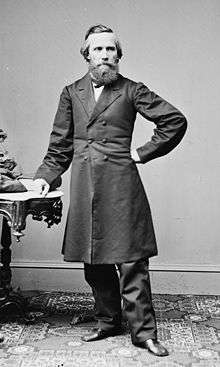 |
Joseph W. McClurg | January 12, 1869 | January 4, 1871 | Republican | Edwin O. Stanard | 1 | ||
| 20 | 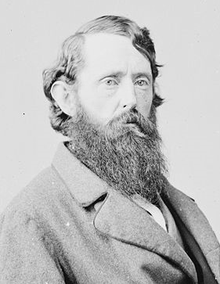 |
B. Gratz Brown | January 4, 1871 | January 3, 1873 | Liberal Republican | Joseph J. Gravely | 1 | ||
| 21 | 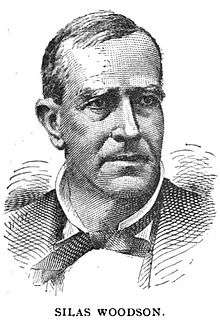 |
Silas Woodson | January 3, 1873 | January 12, 1875 | Democratic | Charles Phillip Johnson | 1 | ||
| 22 |  |
Charles Henry Hardin | January 12, 1875 | January 8, 1877 | Democratic | Norman Jay Coleman | 1 | ||
| 23 |  |
John Smith Phelps | January 8, 1877 | January 10, 1881 | Democratic | Henry Clay Brockmeyer | 1 | ||
| 24 | 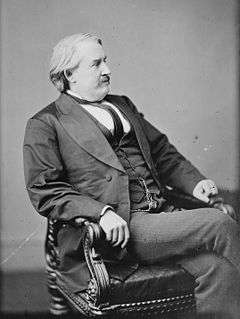 |
Thomas Theodore Crittenden | January 10, 1881 | January 12, 1885 | Democratic | Robert Alexander Campbell | 1 | ||
| 25 | 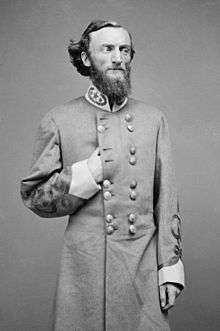 |
John S. Marmaduke | January 12, 1885 | December 28, 1887 | Democratic | Albert P. Morehouse | 1⁄2[C] | ||
| 26 |  |
Albert P. Morehouse | December 28, 1887 | January 14, 1889 | Democratic | Vacant | 1⁄2[L] | ||
| 27 | 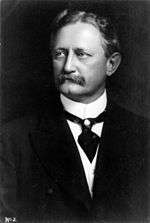 |
David R. Francis | January 14, 1889 | January 9, 1893 | Democratic | Stephen Hugh Claycomb | 1 | ||
| 28 |  |
William J. Stone | January 9, 1893 | January 11, 1897 | Democratic | John Baptiste O'Meara | 1 | ||
| 29 | Lawrence Vest Stephens | January 11, 1897 | January 14, 1901 | Democratic | August Henry Bolte | 1 | |||
| 30 |  |
Alexander Monroe Dockery | January 14, 1901 | January 9, 1905 | Democratic | John Adams Lee | 1 | ||
| Thomas L. Rubey | |||||||||
| 31 |  |
Joseph W. Folk | January 9, 1905 | January 11, 1909 | Democratic | John C. McKinley | 1 | ||
| 32 |  |
Herbert S. Hadley | January 9, 1909 | January 13, 1913 | Republican | Jacob Friedrich Gmelich | 1 | ||
| 33 |  |
Elliot Woolfolk Major | January 13, 1913 | January 8, 1917 | Democratic | William Rock Painter | 1 | ||
| 34 | 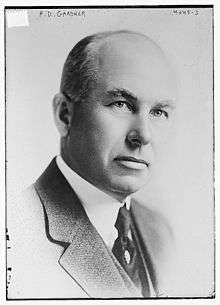 |
Frederick D. Gardner | January 8, 1917 | January 10, 1921 | Democratic | Wallace Crossley | 1 | ||
| 35 |  |
Arthur M. Hyde | January 10, 1921 | January 12, 1925 | Republican | Hiram Lloyd | 1 | ||
| 36 |  |
Samuel Aaron Baker | January 12, 1925 | January 14, 1929 | Republican | Phillip Allen Bennett | 1 | ||
| 37 |  |
Henry S. Caulfield | January 14, 1929 | January 9, 1933 | Republican | Edward Henry Winter | 1 | ||
| 38 |  |
Guy Brasfield Park | January 9, 1933 | January 11, 1937 | Democratic | Frank Gaines Harris | 1 | ||
| 39 | 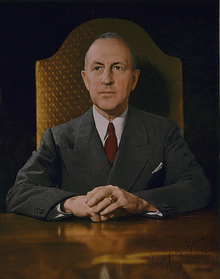 |
Lloyd C. Stark | January 11, 1937 | February 26, 1941 | Democratic | Frank Gaines Harris | 1[Q] | ||
| 40 |  |
Forrest C. Donnell | February 26, 1941 | January 8, 1945 | Republican | Frank Gaines Harris | 1[R] | ||
| 41 |  |
Phil M. Donnelly | January 8, 1945 | January 10, 1949 | Democratic | Walter Naylor Davis | 1 | ||
| 42 |  |
Forrest Smith | January 10, 1949 | January 12, 1953 | Democratic | James T. Blair, Jr. | 1 | ||
| 43 |  |
Phil M. Donnelly | January 12, 1953 | January 14, 1957 | Democratic | James T. Blair, Jr. | 1 | ||
| 44 |  |
James T. Blair, Jr. | January 14, 1957 | January 9, 1961 | Democratic | Edward V. Long | 1 | ||
| 45 |  |
John M. Dalton | January 9, 1961 | January 11, 1965 | Democratic | Hilary A. Bush | 1 | ||
| 46 |  |
Warren E. Hearnes | January 11, 1965 | January 8, 1973 | Democratic | Thomas F. Eagleton | 2 | ||
| William S. Morris | |||||||||
| 47 |  |
Kit Bond | January 8, 1973 | January 10, 1977 | Republican | William C. Phelps | 1 | ||
| 48 | 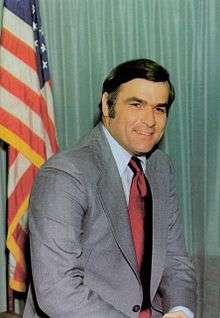 |
Joseph P. Teasdale | January 10, 1977 | January 12, 1981 | Democratic | William C. Phelps | 1 | ||
| 49 |  |
Kit Bond | January 12, 1981 | January 14, 1985 | Republican | Kenneth J. Rothman | 1 | ||
| 50 |  |
John Ashcroft | January 14, 1985 | January 11, 1993 | Republican | Harriett Woods | 2 | ||
| Mel Carnahan | |||||||||
| 51 |  |
Mel Carnahan | January 11, 1993 | October 16, 2000 | Democratic | Roger B. Wilson | 1 1⁄2[C] | ||
| 52 |  |
Roger B. Wilson | October 16, 2000 | January 8, 2001 | Democratic | Joe Maxwell | 1⁄2[L][S] | ||
| 53 |  |
Bob Holden | January 8, 2001 | January 10, 2005 | Democratic | Joe Maxwell | 1 | ||
| 54 |  |
Matt Blunt | January 10, 2005 | January 12, 2009 | Republican | Peter Kinder | 1 | ||
| 55 |  |
Jay Nixon | January 12, 2009 | January 9, 2017 | Democratic | Peter Kinder | 2 | ||
| 56 | 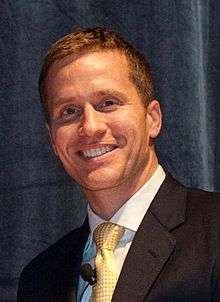 |
Eric Greitens | January 9, 2017 | Incumbent | Republican | Mike Parson | 1 |
Civil War
Missouri, a slave state, was a border state during the Civil War under Union control. However, it was officially recognized as a Confederate state by the Confederate government and was represented in the Confederate Congress and by a star on the Confederate flag. There were two competing governments for the course of the war. The Emancipation Proclamation did not consider Missouri a seceding state, therefore it was not part of Reconstruction. The Missouri Provisional Government is considered the official one on this list.
Missouri secession (Confederate)
- 1861–1862: Claiborne Jackson
- 1862–1865: Thomas Caute Reynolds
Missouri Provisional Government (Union)
- 1861–64: Hamilton Rowan Gamble
- 1864–65: Willard Preble Hall
Notes
- A. ^ Table only includes state governors. 52 people have served as governor, two twice; the table includes these non-consecutive terms as well.
- B. ^ Wilkinson was removed from office by President Thomas Jefferson due to heavy criticism regarding his actions as governor and suspected involvement in the Aaron Burr conspiracy.[3]
- C. a b c d e f Died in office.
- D. ^ Lewis committed suicide or was murdered in Tennessee while en route to Washington to answer complaints about his actions as governor.[4]
- E. ^ Howard resigned from office to accept a commission as brigadier general of the Eighth Military Department.[5]
- F. ^ Vacancies in the office of the lieutenant governor are only listed if they lasted for the entire term. For a complete list of vacancies, see List of Lieutenant Governors of Missouri.
- G. ^ The fractional terms of some governors are not to be understood absolutely literally; rather, they are meant to show single terms during which multiple governors served, due to resignations, deaths and the like.
- H. ^ As president of the state senate, Williams succeeded to the governorship and filled unexpired gubernatorial term of Bates until a special election could be held. The office of lieutenant governor had been vacant following the resignation of Reeves in July 1865.
- I. a b Elected in a special election.
- J. ^ Dunklin resigned from office to be Surveyor General of Missouri and Illinois.
- K. ^ Lieutenant governor Boggs succeeded to governorship and filled the unexpired gubernatorial term of Dunklin and was later elected governor in his own right.
- L. a b c d Lieutenant governor succeeded to governorship, to filled unexpired gubernatorial term.
- M. ^ Polk resigned to take an elected seat in the United States Senate.[6]
- N. ^ Lieutenant governor succeeded to governorship and filled unexpired gubernatorial term until a special election could be held.
- O. ^ The Missouri state convention declared the executive department of the state had expatriated itself and their offices vacant.[7] Jackson had fled the capital and aligned himself with the Confederacy.
- P. ^ Gamble was elected the provisional governor of Missouri by the state convention.[7]
- Q. ^ Stark stayed on as governor beyond the scheduled January 13 departure because the election of Donnell was challenged by the Missouri House of Representative.[8][9]
- R. ^ The Missouri House of Representatives refused to certify the election of Donnell on his scheduled January 13 inauguration until being ordered to do so by the Missouri Supreme Court after the House challenged the election which Donnell won by 3,613 votes.[8][9]
- S. ^ Wilson assumed office at 1:10 AM after Carnahan's body had been formally identified. The date is muddied by online resources which give conflicting dates. The National Governors Association biography lists October 18 as the start date. However, a New York Times article entitled "Pilot Sought Better Weather Before Crash," implies that the swearing in occurred on October 18 or perhaps even on October 19. The article was published on October 19 and it says the official change occurred at 1:10 AM, immediately after Carnahan was identified.[10][11]
Other high offices held
This is a table of congressional, other governorships, and other federal offices held by governors. All representatives and senators mentioned represented Missouri except where noted. * denotes those offices which the governor resigned to take.
| Governor | Gubernatorial term | U.S. Congress | Other offices held | |
|---|---|---|---|---|
| House | Senate | |||
| Benjamin Howard | 1809–1812 (territorial) | U.S. Representative from Kentucky | ||
| John Miller | 1826–1832 | H | ||
| John C. Edwards | 1844–1848 | H | ||
| Austin Augustus King | 1848–1853 | H | ||
| Sterling Price | 1853–1857 | H | ||
| Trusten Polk | 1857 | S* | ||
| Willard Preble Hall | 1864–1865 | H | ||
| Joseph W. McClurg | 1869–1871 | H | ||
| B. Gratz Brown | 1871–1873 | S | ||
| John S. Phelps | 1877–1881 | H | Military Governor of Arkansas[12] | |
| Thomas Theodore Crittenden | 1881–1885 | H | ||
| David R. Francis | 1889–1893 | Ambassador to Russia, U.S. Secretary of the Interior | ||
| William J. Stone | 1893–1897 | H | S | |
| Alexander Monroe Dockery | 1901–1905 | H | ||
| Arthur M. Hyde | 1921–1925 | U.S. Secretary of Agriculture | ||
| Henry S. Caulfield | 1929–1933 | H | ||
| Forrest C. Donnell | 1941–1945 | S | ||
| Kit Bond | 1973–1977 1981–1985 |
S | ||
| John Ashcroft | 1985–1993 | S | U.S. Attorney General | |
| Mel Carnahan | 1993–2000 | Posthumously elected U.S. Senator | ||
Living former U.S. governors of Missouri
As of January 2017, there are six former U.S. governors of Missouri who are currently living, the oldest U.S. governor of Missouri being Kit Bond (served 1973–1977 and 1981–1985, born 1939). The most recent U.S. governor of Missouri to die was Joseph P. Teasdale (served 1977–1981, born 1936) on May 8, 2014. The most recently serving U.S. governor of Missouri to die was Mel Carnahan, who served from January 11, 1993 until his death in a plane crash at the age of sixty-six on October 16, 2000.
| Governor | Gubernatorial term | Date of birth (and age) |
|---|---|---|
| Kit Bond | 1973–1977 1981–1985 |
March 6, 1939 |
| John Ashcroft | 1985–1993 | May 9, 1942 |
| Roger B. Wilson | 2000–2001 | October 10, 1948 |
| Bob Holden | 2001–2005 | August 24, 1949 |
| Matt Blunt | 2005–2009 | November 20, 1970 |
| Jay Nixon | 2009–2017 | February 13, 1956 |
References
General
- "Missouri History - Governors". Missouri Secretary of State. Retrieved 2008-09-11.
- "Missouri History - Lieutenant Governors". Missouri Secretary of State. Retrieved 2008-09-11.
Constitutions
- "1945 Constitution of the State of Missouri" (PDF). Missouri Secretary of State. 2007. Retrieved 2008-09-11.
- Thorpe, Francis Newton (1909). The Federal and State Constitutions: Colonial Charters, and Other Organic Laws of the States, Territories, and Colonies, Now Or Heretofore Forming the United States of America. IV. Washington: Government Printing Office. Retrieved 2008-09-12.
Specific
- ↑ "CSG Releases 2013 Governor Salaries". The Council of State Governments. June 25, 2013. Retrieved November 23, 2014.
- 1 2 3 Shoemaker, Floyd Calvin (1916). Missouri's Struggle for Statehood, 1804-1821. Jefferson City: The Hugh Stephens Printing Co. OCLC 4014912. Retrieved 2008-09-16.
- ↑ Houck, Louis (1908). A History of Missouri from the Earliest Explorations and Settlements Until the Admission of the State Into the Union. 2. Chicago: R. R. Donnelley & Sons Company. OCLC 1199284. Retrieved 2008-09-17.
- ↑ Lewis, Meriwether; Clark, William; Coues, Elliott; Jefferson, Thomas (1893). History of the Expedition Under the Command of Lewis and Clark. 1. New York: Francis P. Harper. OCLC 302121. Retrieved 2008-09-17.
- ↑ Herndon, Dallas Tabor (1922). Centennial History of Arkansas. 1. Chicago, Little Rock: S. J. Clarke Publishing Company. p. 138. ISBN 978-0-89308-068-6. OCLC 11549182.
- ↑ "POLK, Trusten". Biographical Directory of the United States Congress. Retrieved 2008-09-17.
- 1 2 Journal of the Missouri State Convention Held at Jefferson City, July, 1861. St. Louis: George Knapp & Co., Printers and Binders. 1861. OCLC 2650423. Retrieved 2008-09-18.
- 1 2 "Politics In Missouri". The New York Times. 1941-02-22.
- 1 2 "Orders Donnell Seated". The New York Times. 1941-02-20.
- ↑ Bellamy, Clayton (2000-10-17). "Missouri Gov Mel Carnahan Killed In Plane Crash". Stateline.org. Retrieved 2008-09-17.
- ↑ Fountain, John W. (2000-10-19). "Pilot Sought Better Weather Before Crash". The New York Times. Retrieved 2008-09-17.
- ↑ "PHELPS, John S.". Biographical Directory of the United States Congress. Retrieved 2008-09-17.
